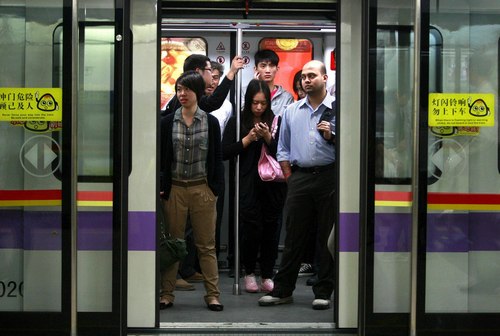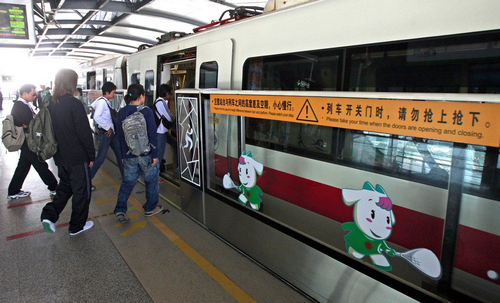Latest News
Guangzhou opens first driverless metro line
(Xinhua)
Updated: 2010-11-09 10:11
 |
Large Medium Small |
|
 Subway turns back to an orderly manner after the cancellation of free subway tickets charges the Guangzhou traffic authority annouced last night on Nov 7,2010. The decision was made in consideration of the overloaded situation since a free charges policy has been applied on Nov.1.To offset the lose, transportation subsidaries will be paid to local residents the authority says on Nov 8,2010.[Photo/Xinhua] |
GUANGZHOU - South China's Guangzhou City, host city of the upcoming Asian Games, opened its first driverless metro line Monday.
The 4-km line links Tianhe District to the north, crosses the Pearl River and ends at the Haizhu District to the south of the Guangzhou, capital city of Guangdong Province.
The line passes through the populous central business district of Guangzhou and was built to alleviate the pressure of a parallel metro line, No 3 metro line, said Ding Jianlong, general manager of Guangzhou Metro Corporation.
|
 Subway turns back to an orderly manner after the cancellation of free subway tickets charges the Guangzhou traffic authority annouced last night on Nov 7,2010. The decision was made in consideration of the overloaded situation since a free charges policy has been applied on Nov.1.To offset the lose, transportation subsidaries will be paid to local residents the authority says on Nov 8,2010.[Photo/Xinhua] |
There is a station every 300 meters along the line, and manual control can not be accurate enough in such a short space of time between stations, said Ding.
The 16th Asian Games will be held in Guangzhou from Nov 12 to 27.
To reduce heavy traffic in the city before and during the Asiad, Guangzhou planned to offer free buses and metro rides for 49 days starting from Nov 1, but the plan had to be aborted after only one week because the subway trains saw the number of passengers double, to 8 million daily.